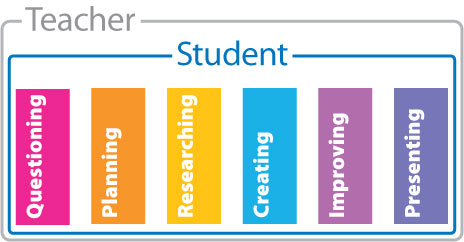How are projects and project-based learning different?
Often, traditional classes have assigned projects--write a poem in the style of Tyger, Tyger Burning Bright; create a rap song about fractions; make a diagram of a eukaryotic animal cell; make a toothpick model of the Nina, Pinta, or Santa Maria. Such projects work wonderfully in traditional classrooms and help students learn content in an enjoyable way. In fact, Inquire includes guidelines and models for many such projects.
In projects like those outlined above, however, students engage in only part of the inquiry process. The teacher does the questioning, planning, and researching and presents all the material to the students. Then, students create something. The teacher and student work together to improve it, and then the student presents the project to the class or puts it in a glass case in the school. The model looks like this:

In a project-based classroom, the student is involved in the inquiry process from the very beginning. Students are immersed in an inquiry experience that gets them thinking about and questioning the topic. Then students work with their teacher to come up with strong, driving questions about the topic and what they want to learn. Together they plan how they are going to go about answering their questions, and then dive together into their research.
Not only are students learning content and concepts, but they are also gaining skills and zeroing in on what they want to do with what they are learning. At that point, students work with their teacher to plan a project that they will create—one that often extends beyond the classroom. Students and teachers might contact those they know in the community who can help as they create their projects. Final projects are presented to an audience that often includes parents and community members. Sometimes projects actually make a change in the world beyond the school. Here's what the project-based model looks like.

In a project-based classroom, the teacher is a facilitator, not a lecturer. Instead of being the source of all knowledge, the teacher is a collaborator who helps students themselves gain the information and skills they need to succeed.
We welcome your input! What experiences have you had with project-based learning, in your class or in another one? Enter comments in the space below.


Comments
Post new comment